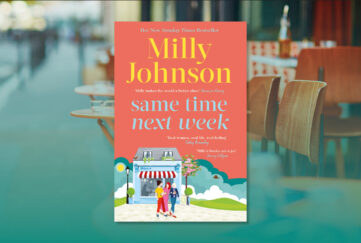Sophie Divry | Madame Bovary of the Suburbs | Every Woman’s Diary

Madame Bovary of the Suburbs by Sophie Divry (translated by Alison Anderson)
MacLehose Press HB, £14.99
Reviewed by Hannah McLaren
Madame Bovary of the Suburbs, reads like the diary every woman has contributed a page to. Spanning from the 1950’s to the edge of 2025, there’s a decade for everyone to get familiar with.
It’s the entire life-story of a young French woman, M.A, who has dreams of one day leading a lavish lifestyle, but ultimately suffers from your average existence. Obsessed with life’s milestones, she is perpetually frustrated. She is only ever briefly happy, should something new and shiny decided to finally glitter on her horizon.
A continuous coming of age
I’d describe this story as one of continuous coming-of-age. Even when M.A is middle-aged, even when she’s old and frail, she doesn’t conform to stereotypes. She often resembles her younger self just puppeteering an older body.
It happens to us all!
The clever, incessant use of ‘you’ as opposed to ‘I’ or ‘she’ throughout the story, highlights that Sophie Divry’s story will force you to self-reflect.
Although M.A. has a fairly selfish outlook on life, it’s hard not to reluctantly see a bit of yourself in every chapter of her life.
She hates to be bored, only thrives when there’s a disturbance in the mundanities of day to day living, and demands constant company. Yet, it’s in her moments alone the greatest moments of insight are to be found.
“Because it is hard to fall asleep in that flat where no-one else, in no other room; no child, no friend, no relative; is there to vanish with us into the night.”
Often, only when alone does she really see the value of the family and friends she keeps. Most of the time, they’re just a welcomed distraction or the ticket to the better life she’s always fantasised about.
A mirror to your own self
M.A for most of her life is almost indifferent to her parents. She’s never entirely sorry about cheating on her husband, and her constant pinning for company feels entirely selfish.
We can all see something of that in ourselves and our friends. We may not act so rashly, but we can all be ungrateful, unaware even, of what we have. Like M.A., we take the best things in our life for granted.
Throughout the narrative, M.A almost has delusions of grandeur at times, convinced she’s worth far more than the good life she leads. But you wouldn’t recognise these moments as outrageous fantasy at first glance, because truthfully, we’ve all had them.
And, as M.A and the pace of the story is accelerating towards her death, what this book ultimately does is strip M.A of even being the main character of this story – the pedestal pulled out from under all our feet.
I won’t spoil the ending and there’s no unexpected twist, but what I will say is the final page may well be a mirror to your own self, and leave you reflecting on what really matters in your life.
Don’t miss our reviews in My Weekly. We’ve two great giveaways in this week’s issue, on sale Tuesday, August 15
More book reviews




